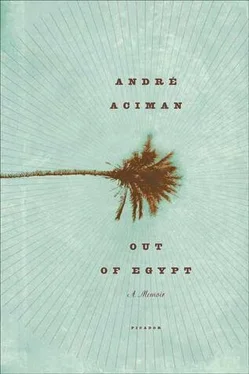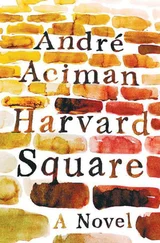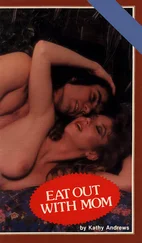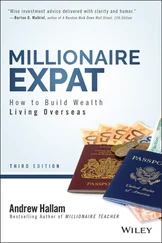It was then that I saw my grandmother, who clearly could not tolerate much more of this, do something I had never seen done in our family: she slapped herself on the face. “ This for allowing my son to marry her. And this”—she slapped her other cheek, harder—“for begging, begging him to remain faithful to her.” “Don’t do that,” shouted my mother, “don’t do that.” She grabbed both of her arms. A quick look at Abdou signified, “Get her a chair.”
Things immediately began to subside. “Do you want to have a stroke, so he’ll be able to blame me for the rest of my life? Enough like this!” Meanwhile, my grandmother had slumped on the chair next to the telephone in the corridor, holding her head in her hands. “I can’t go on like this, can’t go on like this. I don’t want to live, let me die.” “Die?” exclaimed my mother, “she’ll outlive all of us. Sit down. Abdou, bring some water for the signora.”
Finally Abdou and I separated the trio, and I discovered how the quarrel had started. Mother and daughter-in-law had disagreed on the recipe for haroset, the thick preserve made from fruits and wine that is eaten at Passover. My mother wanted raisins and dates, because her mother used raisins and dates, but my grandmother wanted oranges, raisins, and prunes, because this had been her family’s recipe for as far back as she could remember. “ Maudite pesah! Cursed Passover!” cried my grandmother. Sugared water was promptly distributed to all three in their respective rooms. “Your mother should be put away, this is not a life,” said Elsa. When I went to see how my mother was doing, I made the mistake of telling her what Aunt Elsa had said, whereupon she got up and stomped into Elsa’s room, ready to start another row. “But I didn’t mean anything by it,” she pleaded, beginning to sob. “Ach, there is no end to this. Poor Nessim, poor Nessim,” she lamented, then changing her mind, “lucky Nessim, lucky Nessim.”
At that moment the doorbell rang. I was convinced it was one of the neighbors coming to complain about the noise. Instead, standing at our door were two Egyptian gentlemen wearing three-piece suits. “May we come in?” one asked. “Who are you?” “We are from the police.” “One moment,” I said, “I will have to tell them inside,” and, without apologizing, shut the door in their faces. Immediately I rushed inside and told my grandmother, who told Aunt Elsa, who told Abdou to tell the gentlemen to wait outside; she would be with them presently. Aunt Elsa locked her bedroom door, then went to wash her face before walking calmly into the vestibule. “May we come in?” they repeated. “I am a German citizen,” she declaimed as if she had been practicing these lines with a third-rate vocalist for many, many months, “and will not allow you into this house.” “We want to speak to the head of the household.” “He is not here,” she replied. “Where is he?” “I do not know.” “Who is he ?” asked one of the two, pointing at me. “He is a child. He doesn’t know anything,” said Aunt Elsa who, only a few days before, had said I was quite a jeune petit monsieur.
Although she had just sprinkled her face after crying, Aunt Elsa’s glasses were smeared by a white film, probably dried tears, which made her look tattered and poor and certainly not the grande dame she was trying to affect at the moment. “ Cierra la puerta, shut the door,” Aunt Elsa told me in Ladino, referring to the door leading to the rest of the apartment. This was the first time she had ever spoken to me in Ladino, and I pretended not to hear and stood there gaping at the two policemen, while my grandmother, who didn’t want to interfere with her sister’s handling of the men, kept shuffling up and down the long corridor, peeking furtively into the vestibule, only to turn around and walk back along the corridor, pinching her cheeks — a gesture of anxiety in our family — as she repeated to herself “ Guay de mí, guay de mí, woe is me, woe is me.”
Meanwhile, at the other end of the apartment, my mother, who was not even aware of the policemen’s visit, was weeping out loud, and Elsa, who could not understand spoken Arabic very well, kept straining her ears, apologizing for the noise within. “She is crazy,” she said to one of the policemen, referring to my mother. “Toc-toc,” she smiled, rotating her index finger next to her skull, “toc-toc.” The policemen departed, leaving a warrant for my father. “I made them go away,” she said.
Another disaster occurred no more than an hour later. Abdou had left, taking whatever remained of his day off. My mother had gone to wash her face, and, after leaving the bathroom, went directly to her room and slammed the door behind her. My grandmother, who hated sudden noises, winced but said nothing. A while later, on my way to the living room, where I planned to read by myself, I felt something damp about my feet. It was water. Mother, as I immediately realized, had once again forgotten to turn off the faucet and had flooded the bathroom, kitchen, and corridor areas. I rushed to tell her of this latest mishap, and as we were coming out of her room, I saw my grandmother standing in the dark corridor, looking at the ceiling, trying to determine where all this water had come from.
My mother rushed to the kitchen, took as many burlap rags as she could find and immediately threw them on the floor, asking me to help her roll the carpets away from the flood. She then brought a large pail, and kneeling on all fours, was attempting to soak up the water with the rags, wringing and unwringing swatches of cloth that bore the pungent odor of Abdou’s floor wax. “I forgot to turn off the faucet,” she lamented, starting to weep again. “Because I am deaf and because I am crazy, deaf and crazy, deaf and crazy,” she repeated to the rhythm of her sobs. My grandmother, who was also on all fours by now, was busily wringing old towels into the pail, soiling her forearms with the grayish liquid that kept dribbling from the cloth. “It doesn’t matter, you didn’t hear the water, it doesn’t matter,” she kept saying, breaking down as well, finally exclaiming, “ Quel malheur, quel malheur, what wretchedness,” looking up as she wrung the towels, referring to the flood, to Egypt, to deafness, to having to squat on the floor like a little housemaid at the age of ninety because we no longer had servants on Sunday.
Early that evening, the caller rang. “Why were you not at home this afternoon?” asked the voice. “May you rot in sixty hells,” replied my father.
“I want you to sit down and be a big boy now,” said my father that night after reading the warrant. “Listen carefully.” I wanted to cry. He noticed, stared at me awhile, and then, holding my hand, said, “Cry.” I felt a tremor race through my lower lip, down my chin. I struggled with it, bit my tongue, then shook my head to signal that I wasn’t going to cry. “It’s not easy, I know. But this is what I want you to do. Since it’s clear they’ll arrest me tomorrow,” he said, “the most important thing is to help your mother sell everything, have everyone pack as much as they can, and purchase tickets for all of us. It’s easier than you think. But in case I am detained, I want you to leave anyway. I’ll follow later. You must pass one message to Uncle Vili and another to Uncle Isaac in Europe.” I said I would remember them. “Yes, but I also want each message encoded, in case you forget. It will take an hour, no more.” He asked me to bring him a book I would want to take to Europe and might read on the ship. There were two: The Idiot and Kitto’s The Greeks . “Bring Kitto,” he said, “and we’ll pretend to underline all the difficult words, so that if customs officials decide to inspect the book, they will think you’ve underlined them for vocabulary reasons.” He pored over the first page of the book and underlined Thracian, luxurious, barbaroi, Scythians, Ecclesiastes . “But I already know what they all mean.” “Doesn’t matter what you know. What’s important is what they think. Ecclesiastes is a good word. Always use the fifth letter of the fifth word you’ve underlined — in this case, e, and discard the rest. It’s a code in the Lydian mode, do you see?” That evening he also taught me to forge his signature. Then, as they did in the movies, we burned the page on which I had practiced it.
Читать дальше












